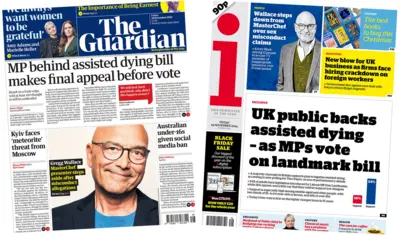We've updated our Privacy and Cookies Policy
We've made some important changes to our Privacy and Cookies Policy and we want you to know what this means for you and your data.
NHS boss: Tax bills could mean 'loss of 60 doctors'
Top Stories
- Author, Chris Vallance
- Role, World at One, ґуПуґ«ГЅ Radio 4
A major NHS trust could lose the equivalent of 60 consultants because of doctors' refusal to work overtime, its chief executive fears.
Dr David Rosser, of University Hospitals Birmingham, said pension tax changes mean consultants fear extra earnings will trigger large bills.
One senior doctor covered shifts, which would otherwise have gone unstaffed, for free to avoid a huge tax bill.
The government said it was looking at more flexible pension rules.
The Department of Health and Social Care said it would be "consulting on proposals to make NHS pensions more flexible for senior clinicians, in response to evidence that shows this issue is having a direct impact on retention and front-line service delivery".
Top Stories
Currently the loss at University Hospitals Birmingham, which employs 1,200 consultants, is equivalent to the work of 10 full-time consultants. The trust fears that could rise to around 60 within 18 months to two years.
Dr Rosser said: "That's a lot of patients whose care will be delayed."
He told ґуПуґ«ГЅ Radio 4's World at One programme: "We are seeing the problem escalating pretty much daily and weekly."
'It costs me ВЈ50.000 to come to work'
Top Stories
Saffron Cordery, deputy chief executive of NHS Providers - which represents hospital trusts - said: "This certainly resonates with what NHS leaders are telling us up and down the country."
Dr Rosser said he had incurred a pension-related tax bill of ВЈ180,000, in addition to income tax, following promotion to chief executive.
"Actually it's costing me ВЈ50,000 to come to work in my first year as chief executive," he said.
Dr Rosser said he was aware of another chief executive in a similar situation.
In 2016, the way pensions were taxed changed. That, and the nature of NHS pensions, have meant consultants and others earning more than ВЈ110,000 a year risk large unexpected tax bills when their income increases.
For that reason, many consultants have been refusing overtime shifts - action that has been linked to recent rises of up to 50% in waiting lists in England.
The trust was already looking at a 40% increase in waiting lists in four to five years' time.
It also means cancelled operations.
Healthwatch Birmingham, which represents local patients, told the ґуПуґ«ГЅ short-notice cancellations were a concern among patients of the trust.
Image source, University Hospitals Trust
One consultant said that she was foregoing some payments so she could cover much-needed shifts without incurring a large tax bill.
Dr Sue Sinclair, a consultant anaesthetist, said she had asked not to be paid for some overtime she worked. Following a pensions-linked tax bill of ВЈ28,000, she decided to retire next year. In the meantime she is covering some shifts for free.
"You know the NHS has been 'running on vapour'," she said. "It's always run on agency work or extra hours' work at evenings and weekends. So we still continue to do some of it, but you just ask them not to pay us for it."
She said a more junior fellow consultant sold her house to cover a similar bill.
'Pressure and unpleasantness'
Her colleague in the intensive care unit, Dr Nick Murphy, described the "fear and uncertainty" the situation causes.
He said he increased his mortgage to cover a previous payment to HMRC and anticipates having to make a further large payment later in the year.
Dr Murphy has not yet decided what he will do to try to reduce his tax liabilities.
Dr Rosser sympathises with his staff, who he says face a stark choice between doing work they know the trust and patients need and risking big tax bills.
"It is very difficult, " he said "It adds extra layers of pressure and unpleasantness on what is a very high-pressure job already."
Top Stories
More to explore
Most read
Content is not available








